Best Media Player Roundup
Apple iTunes
If you own an iPhone, iPad, or iPod touch, you don't necessarily need to have iTunes installed, but it can make life easier. At the same time, it can make things more difficult as well. Say what?
Here's the deal -- if you take the time to really learn iTunes and all its nuances, then you can do most things you'd want to do with your mobile devices. The problem is iTunes is cumbersome and clunky, especially if you've never used it before. It's also a resource hog. Just firing up iTunes consumes about 170MB of RAM, and that's before you do anything with it. To be fair, it's not as heavy on the CPU as it is RAM (and hard drive space).
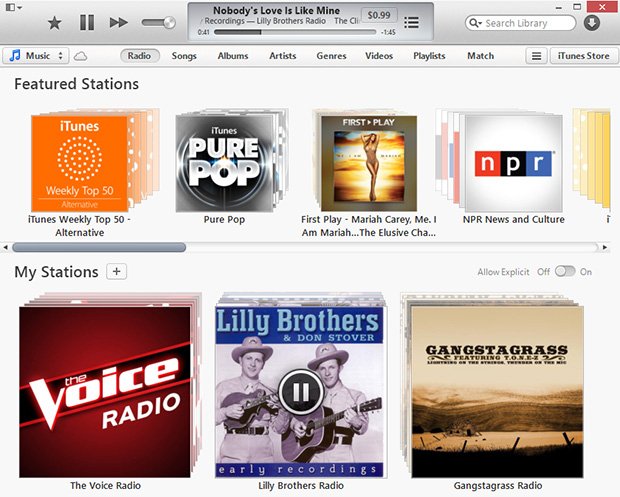
Apple affords end-users a bit of control on the backend, though not much. For example, you can turn on the Sound Enhancer, but you won't find an equalizer. It wouldn't be hard for Apple to add one, but the company is much more focused on making iTunes a content consumption portal -- while manipulating your library can be a bit tricky, it's remarkably easy to spend money on new songs, movies, and TV shows.
While you're encouraged to spend money in iTunes, it's also easy to look up free content. We also have to give props to iTunes for its massive catalog of content. iTunes Radio is another bonus. You can listen to music for free with ads, or subscribe to iTunes Match for $25/year for ad-free music.
Final Word: It's the media player with the biggest catalog, but not the best for managing your content.
Media Player Classic Home Cinema
Sometimes you just want to kick it old school, and that's precisely what Media Player Classic (MPC) does. Well, sort of. The beauty of MPC is that is looks and feels like the Windows Media Player 6.4, an ancient release by today's standards but one that was lightweight and super simple to use. MPC brings back those elements and injects modern features into the mix.
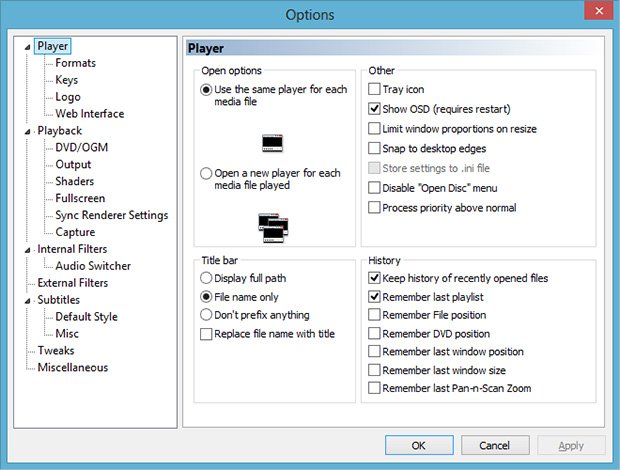
Though nimble in appearance, MPC supports a pretty wide range of file formats. It can play VCD, SVCD, and DVD, as well as process AC3 and DTS audio, among many others. MPC also boasts native playback of OGM and Matroska container formats.
Keep up to date with the most important stories and the best deals, as picked by the PC Gamer team.
Another reason you might want to consider MPC is if you own an older computer. You can watch movies on any SSE processor, which means your 10-year-old PC can become a dedicated media player, if you want it to be.
Final Word: A no-nonsense media player with an old-school design and some new-school tricks.
XBMC
We've featured XBMC on Maximum PC on a few different occasions, including a guide on using XBMC as your media hub and another showing how to organize your music, movies, and ROMs. Unlike traditional media players, however, XBMC isn't designed to work within Windows as one of several programs to manipulate, but as its own OS. It's not really an operating system, but once you fire it up, it looks and feels like one, sort of like Steam's Big Picture mode.
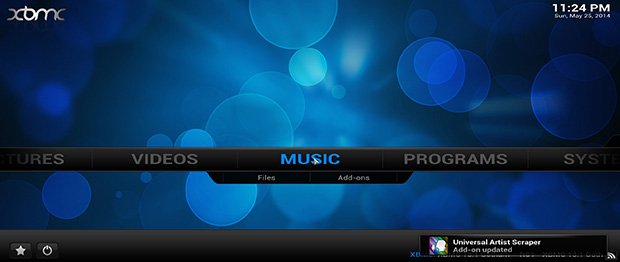
As such, XBMC is best suited for a home theater PC (HTPC). It supports a bunch of different OSes, and once it's up and running, you'll find it also supports lots of different file formats. We're equally impressed with how easy it is to navigate the interface to add and manipulate media, including files found on network-attached devices. It's also capable of streaming over the Internet so you can watch your content when away from home.
Being an open source project with support for plug-ins, XBMC can be as robust as you want it to be. It's definitely overkill if you're not looking to run an HTPC, but otherwise it's one of the best all-around media players on the web.
Final Word: If you're building an HTPC, XBMC is definitely worth a look. Otherwise, look elsewhere.
RealPlayer Cloud
Several years ago, we couldn't uninstall RealPlayer fast enough. It was slow, resource heavy, and at one point it even served up annoying adware. People who wanted to use RealPlayer for one reason or another were advised to download Real Alternative, which allowed the playback of RealMedia files without the obnoxious footprint and adware.
Fast forward to today and RealPlayer is now RealPlayer Cloud with a different focus. It's dubbed as being "Dropbox for video," and that's not an inaccurate descripton. RealPlayer Cloud takes a different approach to media. Any time you upload a file to your personal folder in the cloud, RealPlayer Cloud will transcode it into different formats that your mobile devices can understand. This eliminates the need to transcode files on your own for various mobile gadgets, but it also means you'll chew through storage space.
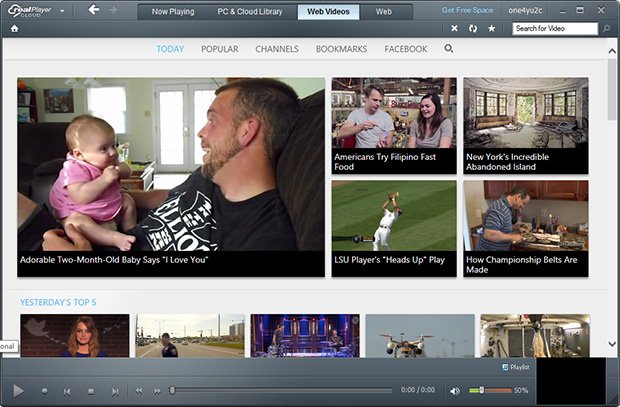
RealPlayer Cloud offers 2GB of cloud storage for free, plus 1GB of additional storage for you and a friend each time you refer someone. Adding devices nets you an additional 250MB, as does both adding and sharing a video. If that's still not enough, you can sign up for a Silver plan (25GB for $4.99/month), Gold plan (100GB for $9.99/month), or Pro plan (300GB for $29.99/month).
You don't need to tap into the cloud to use RealPlayer Cloud, it will happily serve up your local audio and video files, too. And if you want to hide certain videos that might not be appropriate for little Johnny to see (or whoever else might use your PC), you can initiate Private Mode. This will put videos in a hidden folder that's unlockable with a PIN code, as well as clear your clip history when you're finished.
Final Word: Forget what you remember about RealPlayer and give RealPlayer Cloud a look.
KMPlayer with Connect (Beta)
The latest version of KMPlayer is a beta release that works in tandem with your mobile devices. You input a PIN code and password on, say, your mobile phone and you can access your media.
On the desktop, KMPlayer supports almost everything under the sun, even damaged AVI files. There's also a 3D mode. Behind the scenes are a lot of dials and knobs to play with, and while they're pretty straightforward, less savvy and/or casual users might feel overwhelmed. That said, power users will delight in all the options, including some unexpected ones, like Intel WiDi support.
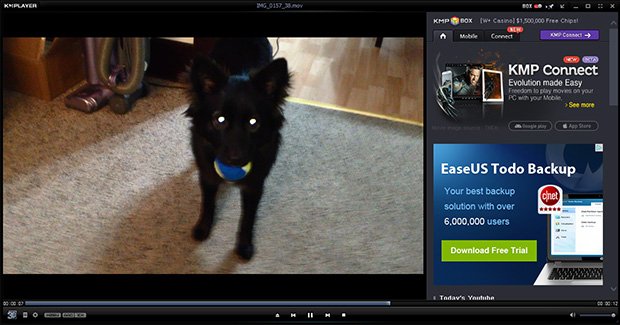
This is a big program along the lines of iTunes or Windows Media Player. It also tries to bring some friends along for the ride during installation -- pay attention to those checkboxes or you'll end up with unrelated third-party software.
Final Word: A full featured media player best suited for power users.
And the Media Player Winner is...
There were quite a few contenders here -- more than we expected, actually -- but when the dust settled, we had to give the nod to VLC as the overall best media player. That doesn't mean you should ignore the other options if there's one you like better. However, we chose VLC in what turned out to be a close race because of its lightweight and no-nonsense approach combined with its wide range of CODEC support.
We also have to give a shout out to RealPlayer Cloud. It's not anything like the RealPlayer of yesteryear, and we really like its cloud approach to media. We're all pushing smartphones and tablets these days, and RealPlayer Cloud makes it easy to access all our content on-the-go, albeit you're only allotted 2GB of storage space for free.
Paul has been playing PC games and raking his knuckles on computer hardware since the Commodore 64. He does not have any tattoos, but thinks it would be cool to get one that reads LOAD"*",8,1. In his off time, he rides motorcycles and wrestles alligators (only one of those is true).


